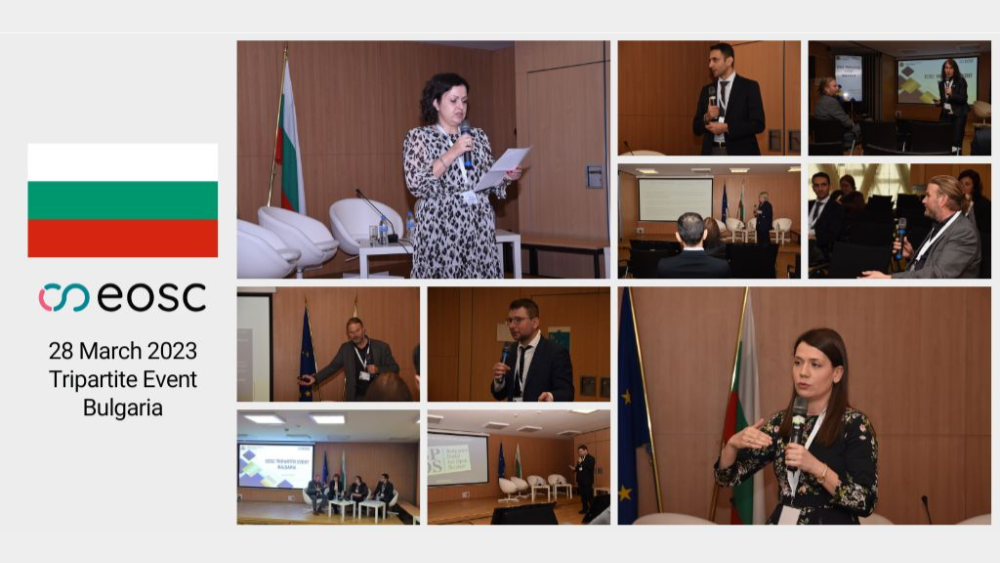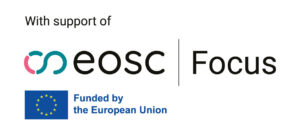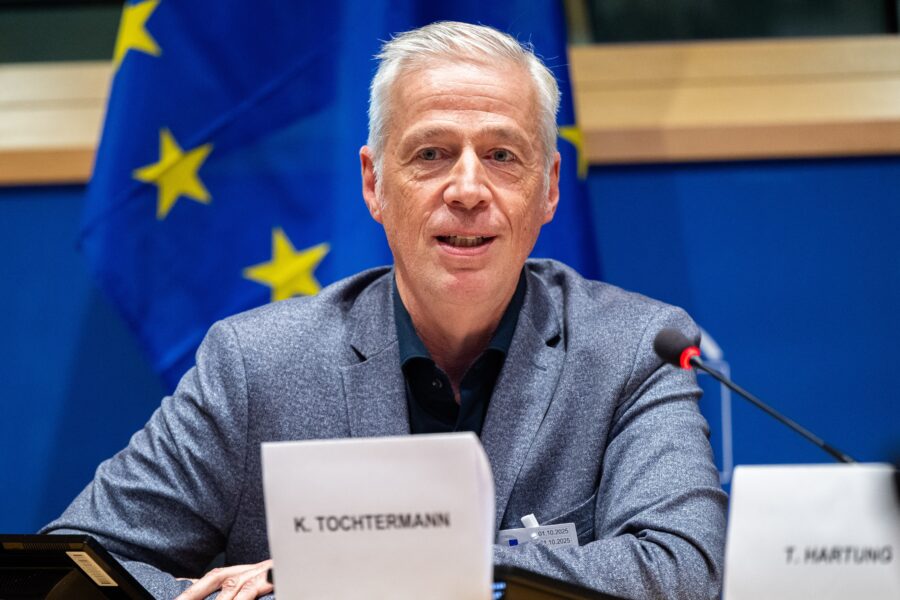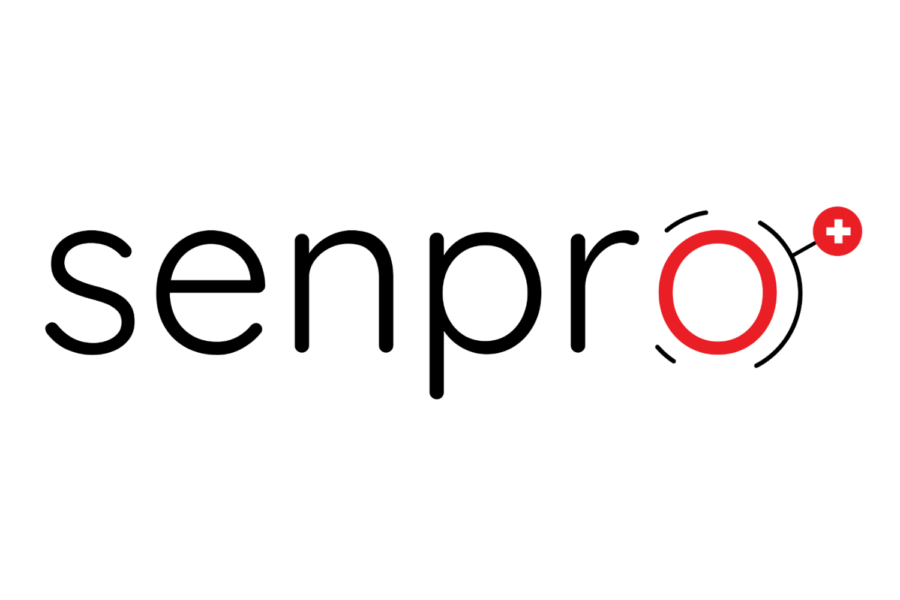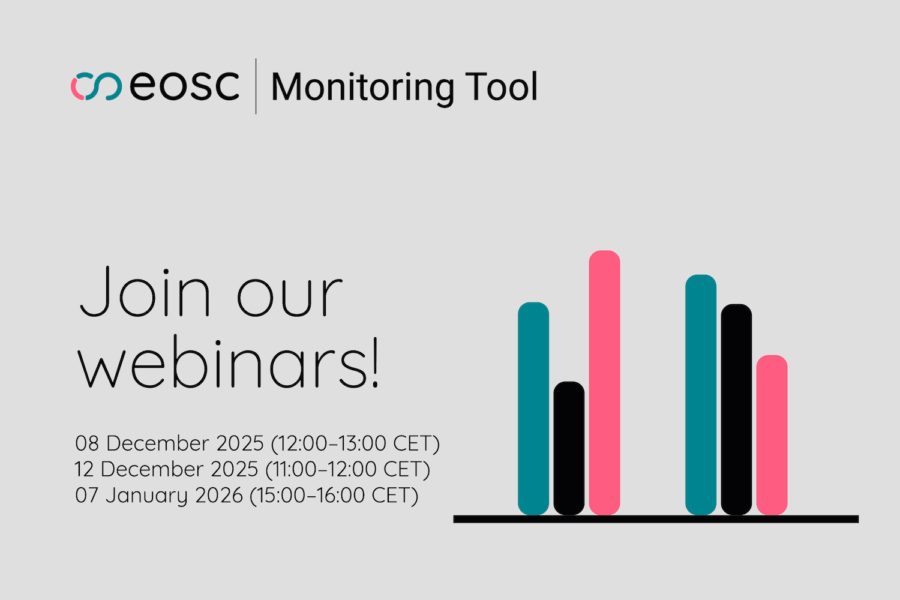Bulgarian Ministry of Education and Science organised the first EOSC-A National Tripartite Event in Sofia, Bulgaria on 28 March 2023.
The hybrid event was attended by 90 representatives (on-line and on-site) from researchers, e-infrastructure providers, Research Infrastructures centres and policy stakeholders in the frame of the EOSC from different countries. It was organised in eight presentations and two panel sessions.
The host of the event, prof. Albena Chavdarova – Deputy Minister, SD Director, and Michael Arentoft – Head of DG RTD’s ‘Open Science’ Unit welcomed participants and speakers and gave the introductory talk about the tripartite collaboration and EOSC initiatives.
The first session focused on how EOSC is structured and governed.
Wilhelm Widmark – EOSC Association Director, introduced the tripartite collaboration. He stressed the need for concrete implementation strategies for EOSC, especially at the national level.
European Commission perspectives on Open Science were presented by Pantelis Tziveloglou, representing the Policy Office, DG RTD’s ‘Open Science’ Unit.
As a continuation of the approximation of the principles and activities of the EOSC and its structures Yanita Zherkova and prof. Giorgio Rossi presented the EOSC Steering Board role.
The second session started with the presentation of the ESFRI support and coordination measures, presented by Karina Angelieva, a member of the ESFRI Executive Board.
It was followed by a series of presentations on the EOSC development at the country level.
Programme and presentations can be found on the Bulgarian country page
Milena Damyanova, director of Science Directorate, presented the National Action Plan for OS in Bulgaria. She stressed that Bulgaria’s National Open Science Plan aims to maintain a trusted infrastructure for Open Access to publications and data, incentivising and promoting OS practices in the community.
Hristianiya Ancheva and dr. Jordan Iliev representing the National Center for Information and Documentation presented the Bulgarian Portal for Open Science (BOPS). Since 2020 BOPS has seen a constant increase in users and organisations, contributing to the uptake of best practices for research in Bulgaria. Hristianiya Ancheva stressed that: BPOS has contributed to advancing Open Science as the new normal in the country thanks to targeted actions focusing on access to infrastructures, provision of training, and supporting OS practices uptake with incentives.
Prof. Ana Proykova – coordinator of EOSC association member, presented the activities of Sofia University as an EOSC Association member. Sofia University is currently the only EOSC Association Member in Bulgaria, working on key topics: engaging stakeholders at the national level, disseminating and promoting EOSC, and connecting national actors with EOSC Governance.
As the session’s final presentation, Prof. Aneta Karaivanova presented the Open Science Memorandum of understanding of Bulgarian RPOs.
Following the lunch, the event continued with a panel discussion focusing on infrastructures in support of Open Science and FAIR data, and maximising the benefits of research data, with guests from key RIs and EOSC-related initiatives. The panel was moderated by Prof. Vladimir Bozhilov, and featuring Wilhelm Widmark (EOSC Association Director and Library Director of Stockholm University), Prof. Radka Kaneva (BBMRI Bulgaria coordinator), Prof. Milena Dobreva (GATE Research institute), Prof. Jacques Demotes (Director General of ECRIN), Dr. Ilire Hasani-Mavriqi (TU Graz) and Prof. Giorgio Rossi (EOSC SB member). Panellists answered the questions about how different countries and research institutions helping to implement the Open Data Policy and what are the best practices for preserving data. They also discussed how to protect the data, make it accessible to particular types of users and what type of IT solutions are available. One topic was also current obstacles in maximising the benefits of research data and what can be done to address these problems. Panellists also discussed what measures different institutions have taken, what the challenges are and what is planned next regarding the performance indicators on the accessibility of the data. They also discussed common standards for data storage and citizens’ access to data and engaging the society as a whole to co-create scientific knowledge. One of the conclusions of the panel, addressed by Giorgio Rossi, was: Interoperability between infrastructures has obvious consequences on the interoperability of data. We need a technology leap to meet the needs of research communities, allowing for FAIR by design data to be collected automatically.
The event concluded with a lively panel discussion moderated by Prof. Vladimir Bozhilov, and featuring: Volker Beckmann (EOSC SB member from France), Dr. Anna Wałek (Polish National Science Centre coordinator of the East Hub in the EOSC Focus Project), Jiří Marek (Head of EOSC-CZ Secretariat, Masaryk University), Prof. Aneta Karaivanova (Institute of Information and Communication Technologies – BAS) and Pilar Rico-Castro (EOSC SB member from Spain). In the second panel, participants explored EOSC policies and funding mechanisms at national and cross-border levels. They discussed mechanisms for implementing the Open Science Policy at national levels; what is the good balance between EU funding, institutional funding and funding from national budgets to implement the Open Science Policy initiatives, and issues related to monitoring Open Science Policy implementations.
After the second panel and discussion, Yanita Zherkova and Pantelis Tziveloglou closed the first EOSC Tripartite event in Bulgaria by thanking the audience and speakers for their contribution. Wishing everyone also more opportunities for cross-border and cross-domain interactions.
Both the organisers and participants found the event very fruitful and successful. Yanita Zherkova expressed the hope that it is a starting point for further intensive forms of exchanging experiences and building various forms of involvement in the EOSC. Pantelis Tziveloglou thanked all speakers and participants and congratulated the organisers. He also expressed his hope for further intensive cooperation.

